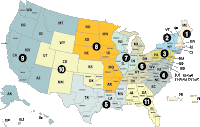In In re: Grand Jury Subpoena Duces Tecum Dated March 25, 2011, the Eleventh Circuit released a published opinion and reversed a district court's order finding Doe in civil contempt.
Doe was subpoened to testify before a grand jury and to bring his external hard drives with him. "The subpoena required Doe to produce the 'unencrypted contents' of the digital media, and 'any and all containers or folders thereon.'” In total, there were approximately 5TB of hard drives and they were encrypted with TrueCrypt. "Federal Bureau of Investigation forensic examiners analyzed the digital media, but were unable to access certain portions of the hard drives" and "the forensic examiners were unable to recover any data." As the court noted, "[e]ssentially, TrueCrypt can make certain data inaccessible; in doing so, the program can create partitions within a hard drive so that even if one part of the hard drive is accessed, other parts of the hard drive remain secured."
After Doe informed the
United States Attorney that he would not decrypt the hard drives, the U.S. Attorney sought and obtained an order providing Doe "immunity for the act of production of the unencrypted drives, but [did] not convey immunity regarding the United States’ [derivative] use of the decrypted contents of the drives."
Doe appeared before the grand jury and refused to decrypt the hard drives. "The U.S. Attorney immediately moved the district court for an order requiring Doe to show cause why Doe should not be held in civil contempt. The court issued the requested order, requiring Doe to show cause for his refusal to decrypt the hard drives. Doe, responding, explained that he invoked his Fifth Amendment privilege against self-incrimination because the Government’s use of the decrypted contents of the hard drives would constitute derivative use of his immunized testimony, use not protected by the district court’s grant of immunity...The court rejected Doe’s alternative explanations, adjudged him in contempt of court, and ordered him incarcerated."
The court stated:
We turn now to the merits of Doe’s appeal. In compelling Doe to produce the unencrypted contents of the hard drives and then in holding him in contempt for failing to do so, the district court concluded that the Government’s use of the unencrypted contents in a prosecution against Doe would not constitute the derivative use of compelled testimony protected by the Fifth Amendment privilege against self-incrimination. This is so, the court thought, because Doe’s decryption and production of the hard drives would not constitute “testimony.” And although that was the Government’s view as well, the Government nonetheless requested act-of-production immunity. The district court granted this request.
For the reasons that follow, we hold that Doe’s decryption and production of the hard drives’ contents would trigger Fifth Amendment protection because it would be testimonial, and that such protection would extend to the Government’s use of the drives’ contents. The district court therefore erred in two respects. First, it erred in concluding that Doe’s act of decryption and production would not constitute testimony. Second, in granting Doe immunity, it erred in limiting his immunity, under 18 U.S.C. §§ 6002 and 6003, to the Government’s use of his act of decryption and production, but allowing the Government derivative use of the evidence such act disclosed.



0 comments:
Post a Comment